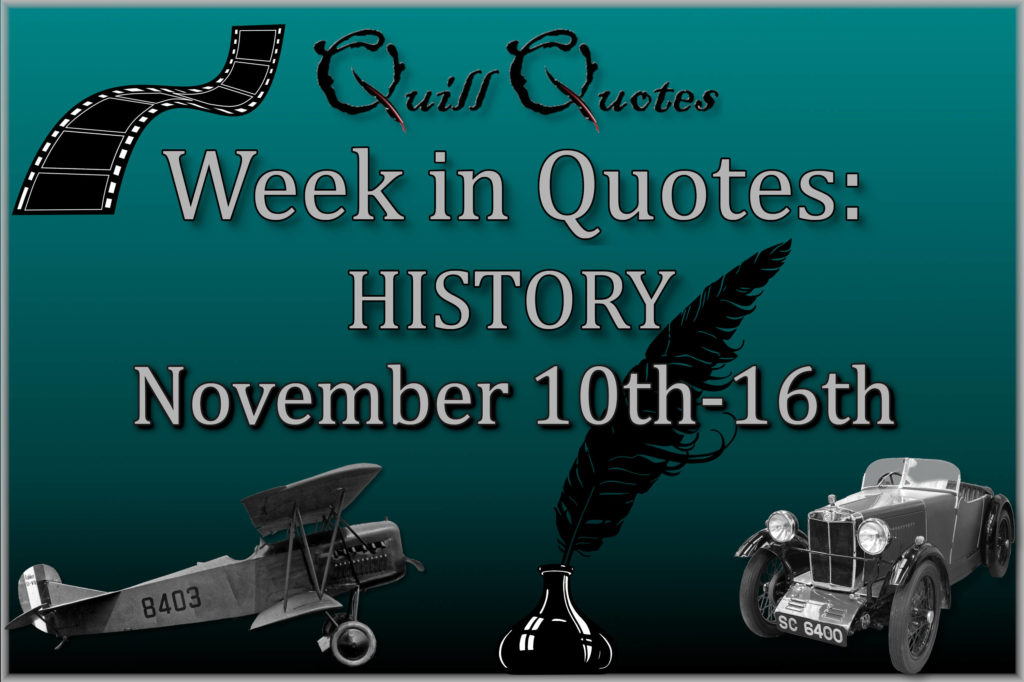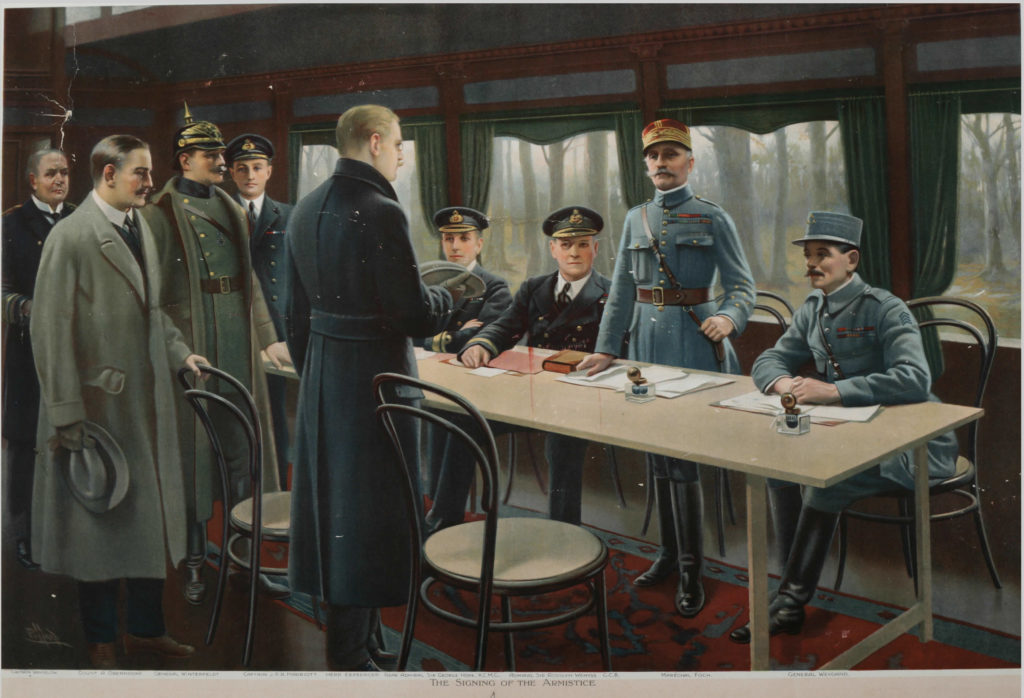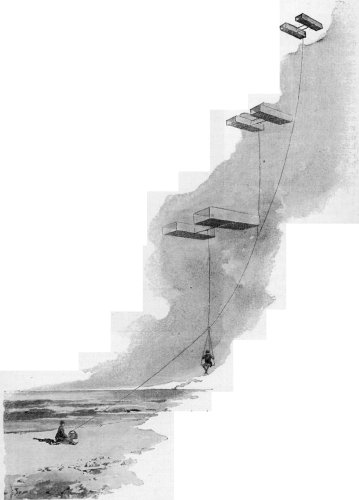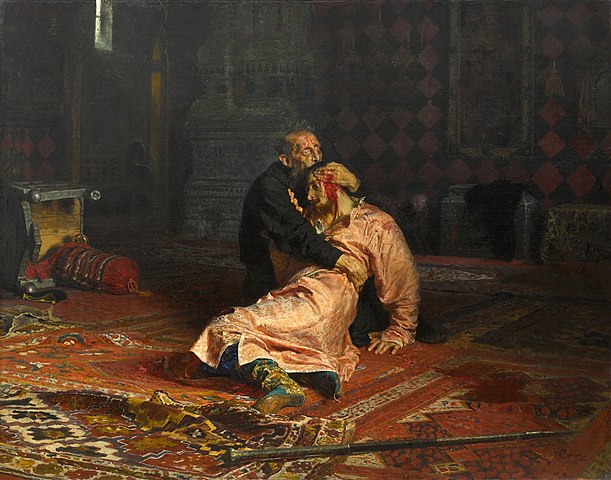There is always much to learn from quotes and their historical significance. Read on for a collection of quotes and general history from November 10th – 16th.

November 10, 1871
“Dr. Livingstone, I presume?”
– Henry Morton Stanley
On November 10, 1871, two famous explorers, Henry Morton Stanley and David Livingstone, met in the town of Ujiji on the shores of Lake Tanganyika in Central Africa. Stanley’s greeting of “Dr. Livingstone, I presume?”, upon their meeting as the only white men for hundreds of miles, has since become famous. Livingstone was obsessed with finding the sources of the Nile River, believing the discovery would help his missionary efforts and give him the influence to end the East African Arab-Swahili slave trade. Having lost contact with the outside world for several years, the New York Herald sent Stanley to find him. Following Livingstone’s death in 1873, Stanley continued the search for the Nile’s sources, identifying the Victoria Nile originating from Lake Victoria. While the two major Nile tributaries, the White Nile and the Blue Nile, have since been discovered, the most distant source is still undetermined.

November 11, 1918
“It was a few minutes before the eleventh hour of the eleventh day of the eleventh month. I stood at the window of my room looking up Northumberland Avenue towards Trafalgar Square, waiting for Big Ben to tell that the War was over. My mind strayed back across the scarring years to the scene and emotions of the night at the Admiralty when I listened for these same chimes in order to give the signal of war against Germany to our Fleets and squadrons across the world. And now all was over! The unarmed and untrained island nation, who with no defence but its Navy had faced unquestioningly the strongest manifestation of military power in human record, had completed its task. Our country had emerged from the ordeal alive and safe, its vast possessions intact, its war effort still waxing, its institutions unshaken, its people and Empire united as never before. Victory had come after all the hazards and heartbreaks in an absolute and unlimited form. All the Kings and Emperors with whom we had warred were in flight or exile. All their Armies and Fleets were destroyed or subdued. In this Britain had borne a notable part, and done her best from first to last.”
– Winston Churchill
On November 11, 1918, the Armistice with Germany was signed, bringing World War I to an end. Although not a formal surrender, the Armistice marked Germany’s defeat and Allied victory. Due to the Armistice coming into effect at 11:00 a.m. Paris time, the end of the war is often referred to as “the eleventh hour of the eleventh day of the eleventh month”. While the fighting ended on this date, the Armistice had to be extended three times before peace was officially reached with the signing of the Treaty of Versailles on June 28, 1919. Commemorating the end of WWI, November 11 is a holiday in many countries. The U.S. celebrates the date as Veterans Day, while others call it Armistice Day or Remembrance Day, and in Poland, it is Independence Day!

November 12, 1894
“Workers must root out the idea [that] by keeping the results of their labours to themselves a fortune will be assured to them. Patent fees are much wasted money. The flying machine of the future will not be born fully fledged and capable of a flight for 1000 miles or so. Like everything else it must be evolved gradually. The first difficulty is to get a thing that will fly at all. When this is made, a full description should be published as an aid to others. Excellence of design and workmanship will always defy competition.”
– Lawrence Hargrave
On November 12, 1894, Australian inventor Lawrence Hargrave flew 16 feet into the air under a train of 4 box kites he developed. The feat was widely publicized and established the box-kite principle for use in many early gliders and airplanes. Hargrave is also significant for his study of airfoils and work on the rotary engine, among other inventions. Despite the money he could make, Hargrave refused to patent any of his inventions, believing scientific communication was key to further progress. Although the Wright brothers are often credited with the invention of human flight, Professor Richard Threlfall said Hargrave “probably did as much to bring about the accomplishment of dynamic flight as any other single individual”.

November 13, 1942
“The action was illuminated in brief, blinding flashes by Jap searchlights which were shot out as soon as they were turned on, by muzzle flashes from big guns, by fantastic streams of tracers, and by huge orange-colored explosions as two Jap destroyers and one of our destroyers blew up… From the beach it resembled a door to hell opening and closing … over and over.”
– Ira Wolfert, American war correspondent
The Naval Battle of Guadalcanal took place from November 12-15, 1942, in the Solomon Islands during World War II. With the first major engagement occurring in the early morning of the 13th, it is sometimes called the Battle of Friday the 13th. The battle centered around Japanese efforts to land reinforcements on Guadalcanal and retake the strategic airfield there, Henderson Field. Despite heavy losses on both sides, particularly during the two nighttime engagements, the Allies prevented the majority of troop transports from landing and achieved a crucial strategic victory for the Guadalcanal campaign. Upon hearing of the outcome, President Franklin D. Roosevelt said, “it would seem that the turning point in this war has at last been reached.”
November 14, 1889
“I would not race. If someone else wants to do the trip in less time, that is their concern.”
– Nellie Bly
On November 14, 1889, American journalist Nellie Bly began her trip around the world, successfully besting the fictitious journey of Phileas Fogg in Jules Verne’s Around the World in Eighty Days. She completed the journey in 72 days, returning to New York on January 25, 1890! Born Elizabeth Cochran, she took the pen name “Nellie Bly” when she began work as a journalist with the Pittsburgh Dispatch in 1885. Prior to her around the world journey, Bly made a name for herself pioneering a new kind of investigative journalism. Most notably, writing an exposé on the Women’s Lunatic Asylum on Blackwell’s Island after purposefully getting herself admitted there.

November 15, 1777
“The said States hereby severally enter into a firm league of friendship with each other, for their common defense, the security of their liberties, and their mutual and general welfare, binding themselves to assist each other, against all force offered to, or attacks made upon them, or any of them, on account of religion, sovereignty, trade, or any other pretense whatever.”
– The Articles of Confederation and Perpetual Union
The Articles of Confederation and Perpetual Union were finalized on November 15, 1777, becoming the first constitution of the 13 original U.S. states. The Articles preserved the independence and sovereignty of the states in a “league of friendship”, only giving the central government the powers recognized by the former colonies as belonging to king and parliament. Unfortunately, this system quickly proved ineffective with the weak central government unable to control taxation and foreign policy. By May 25, 1787, the need for change was recognized and the Constitutional Convention began to draft the constitution we know today.
November 16, 1581
“May I be damned! I’ve killed my son! I’ve killed my son!”
– Ivan the Terrible
On November 16, 1581, Ivan the Terrible is believed to have mortally wounded his eldest son, Ivan Ivanovich, when he struck him with his scepter during an argument. As the first Tsar of Russia, Ivan IV Vasilyevich was an intelligent ruler but became known as Ivan the Terrible for his mental instability and violent outbursts. The death of his eldest son paved the way for the Time of Troubles with his only remaining heir, Feodor Ivanovich, largely incapable of ruling.

In case you missed last week’s quotes, see History November 3rd – 9th.
To never miss a Quill Quotes post, please subscribe via email and/or follow us on social media!
Leave a Reply